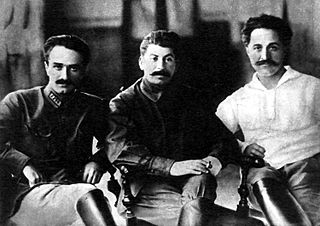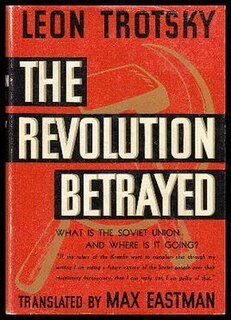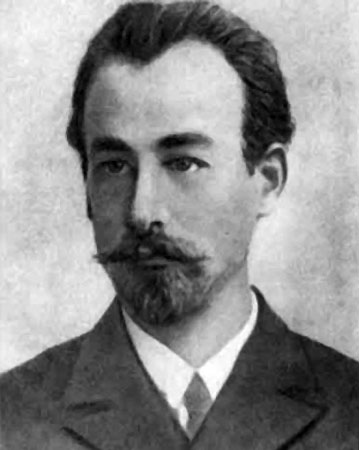
Lev Davidovich Bronstein, better known as Leon Trotsky, was a Soviet revolutionary, Marxist theorist and politician whose particular strain of Marxist thought is known as Trotskyism.
Trotskyism is the theory of Marxism as advocated by the Russian revolutionary Leon Trotsky. Trotsky identified as an orthodox Marxist and Bolshevik–Leninist. He supported founding a vanguard party of the proletariat, proletarian internationalism and a dictatorship of the proletariat based on working class self-emancipation and mass democracy. Trotskyists are critical of Stalinism as they oppose Joseph Stalin's theory of socialism in one country in favor of Trotsky's theory of permanent revolution. Trotskyists also criticize the bureaucracy that developed in the Soviet Union under Stalin.

Nadezhda Konstantinovna Krupskaya was a Russian Bolshevik and the wife of Vladimir Lenin.
Lenin's Testament is the name given to a document purportedly dictated by Vladimir Lenin in the last weeks of 1922 and the first week of 1923. In the testament, Lenin proposed changes to the structure of the Soviet governing bodies. Sensing his impending death, he also gave criticism of Bolshevik leaders Zinoviev, Kamenev, Trotsky, Bukharin, Pyatakov and Stalin. He warned of the possibility of a split developing in the party leadership between Trotsky and Stalin if proper measures were not taken to prevent it. In a post-script he also suggested Joseph Stalin be removed from his position as General Secretary of the Russian Communist Party's Central Committee. Isaac Deutscher, a biographer of both Trotsky and Stalin, wrote, "The whole testament breathed uncertainty".
The United Opposition was a group formed in the All-Union Communist Party (Bolsheviks) in early 1926, when the Left Opposition led by Leon Trotsky, merged with the New Opposition led by Grigory Zinoviev and his close ally Lev Kamenev, in order to strengthen opposition against the Joseph Stalin led Centre. The United Opposition demanded, among other things, greater freedom of expression within the Communist Party and less bureaucracy.

Novaya Zhizn was the first legal Bolshevik daily newspaper. Its first editor was Maxim Litvinov. It was first published in October, 1905, in Petersburg, under the guidance of Lenin. It was published until December 1905.

The Chita Republic was a worker's republic in Chita, under control of the Soviet of Workers’, Soldiers’ and Cossaks’ from 1905-1906. Chita, a city in eastern Siberia, Russia, and a place of exile for early revolutionaries and combatants of the Russo-Japanese War, was a center for worker unrest in the early 1900s. During the Russian Revolution of 1905 armed revolutionaries under the leadership of the RSDLP headed by Viktor Kurnatovsky took control over the city and declared the Chita Republic in December 1905.

The Georgian affair of 1922 was a political conflict within the Soviet leadership about the way in which social and political transformation was to be achieved in the Georgian SSR. The dispute over Georgia, which arose shortly after the forcible Sovietization of the country and peaked in the latter part of 1922, involved local Georgian Bolshevik leaders, led by Filipp Makharadze and Budu Mdivani, on one hand, and their de facto superiors from the Russian SFSR, particularly Joseph Stalin and Grigol Ordzhonikidze, on the other hand. The content of this dispute was complex, involving the Georgians' desire to preserve autonomy from Moscow and the differing interpretations of Bolshevik nationality policies, and especially those specific to Georgia. One of the main points at issue was Moscow's decision to amalgamate Georgia, Armenia and Azerbaijan into Transcaucasian SFSR, a move that was staunchly opposed by the Georgian leaders who urged for their republic a full-member status within the Soviet Union.
Censorship of images was widespread in the Soviet Union. Visual censorship was exploited in a political context, particularly during the political purges of Joseph Stalin, where the Soviet government attempted to erase some purged figures from Soviet history, and took measures which included altering images and destroying film. The USSR curtailed access to pornography, which was specifically prohibited by Soviet law.
Joseph Stalin was a Georgian born student radical who became a member and eventually a leader of the Bolshevik faction of the Russian Social Democratic Labour Party. He served as the General Secretary of the Central Committee of the Communist Party of the Soviet Union from 1922 until his death in 1953. In the years following the death of Vladimir Lenin, he rose to become dictator of the Soviet Union, using a combination of manipulation and terror to destroy his opposition.

Yemelyan Mikhailovich Yaroslavsky was a Bolshevik revolutionary, Communist Party member, journalist and historian.

The 5th Congress of the Russian Social Democratic Labour Party was held in London between May 13 and June 1, 1907. The 5th Congress had the largest attendance of the Congresses of the unified RSDLP. Thirty-five sessions of the Congress were held in the Brotherhood Church in Hackney, during which stormy debates took place.

The 1907 Tiflis Bank Robbery, also known as the Erivansky Square expropriation, was an armed robbery on 26 June 1907 in the city of Tiflis in the Tiflis Governorate in the Caucasus Viceroyalty of the Russian Empire. A bank cash shipment was stolen by Bolsheviks to fund their revolutionary activities. The robbers attacked a bank stagecoach, and the surrounding police and soldiers, using bombs and guns while the stagecoach was transporting money through Erivansky Square between the post office and the Tiflis branch of the State Bank of the Russian Empire. The attack killed forty people and injured fifty others, according to official archive documents. The robbers escaped with 341,000 rubles.

Grigory Alekseyevich Aleksinsky (1879–1967) was a prominent Russian Marxist theorist, Social Democrat and Bolshevik who was elected to the Second Duma in 1907.

Lev Borisovich Kamenev was a Bolshevik revolutionary and a prominent Soviet politician. He was one of the seven members of the first Politburo, founded in 1917 to manage the Bolshevik Revolution: Lenin, Zinoviev, Kamenev, Trotsky, Stalin, Sokolnikov and Bubnov.

The Revolution Betrayed: What Is the Soviet Union and Where Is It Going? is a book published in 1937 by the exiled Soviet Bolshevik leader Leon Trotsky. This work analyzed and criticized the course of historical development in the Soviet Union following the death of Lenin in 1924 and is regarded as Trotsky's primary work dealing with the nature of Stalinism. The book was written by Trotsky during his exile in Norway and was originally translated into Spanish by Victor Serge. The most widely available English translation is by Max Eastman.
Sylvester Dzhibladze was a founder of the Social-Democratic movement in the Caucasus and one of Joseph Stalin's teachers. He went to the same seminary as Stalin and had hit his teacher for insulting the Georgian language. He was one of the leaders of the Social-Democratic organisation in Tiflis, Georgia. In July 1903, after spending a period of time in prison, he was banished to Eastern Siberia for three years, together with 15 other political prisoners, including Kurnatovsky, Franchesky and Joseph Djugashvili (Stalin).
Vperyod (Forward) was the factional newspaper of the Bolsheviks after the split at the second congress of the Russian Social Democratic Labour Party. The first issue of the paper was published on 22 December 1904 in Geneva.

Georgy Ivanovich Safarov was a Bolshevik revolutionary and politician who was a participant in the Russian Revolution and the Russian Civil War, and a participant in the executions of the Romanovs in Yekaterinburg and Alapayevsk. Later associated with Grigory Zinoviev's New Opposition and Leon Trotsky's United Opposition, he was purged from the Communist Party, and was later imprisoned in Vorkuta in 1937, after which he served as an NKVD informant. He was ultimately executed on 27 July 1942 by a Special Collegium of the NKVD. He is one of the only victims of Joseph Stalin's purges that was not posthumously rehabilitated or reinstated to the party after his death.
Iosif Fyodorovich Dubrovinsky, alias Innokenty was a leading Bolshevik and comrade of Vladimir Lenin prior to the Russian Revolution.












